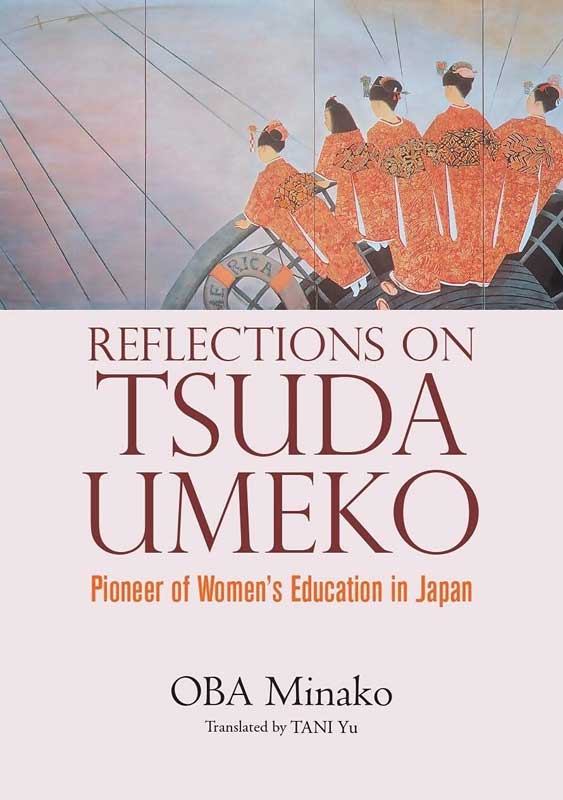Reflections on Tsuda Umeko: Pioneer of Women's Education in Japan
by Oba Minako
Japan Publishing Industry Foundation for Culture (2021)
ISBN: 978-1-60598-071-3
263pp; hardback
On December 23, 1871, six-year-old Umeko Tsuda was put on a boat along with four other young Japanese girls and sent from Tokyo to America, tasked with the responsibility of learning the English language and American customs. She was part of the famed Iwakura Mission, assembled to renegotiate unequal treaties that Japan had signed, garner recognition for Emperor Meiji's newly reinstated imperial dynasty, and study America and its structures and systems.
By the time Tsuda returned 11 years later as an American high school graduate, Japan had lost much of its fire to learn about America and its ways, and Tsuda was met with neither excitement nor contempt, but mostly indifference. Instead of just melting back into Japan's everyday life, she took it upon herself to try to bring Japan, at least in terms of educating its girls, into modern times.
Starting as a lowly teacher, Tsuda soon decided that she needed more education if she was to help Japanese women become full participants of society. She returned to America, graduated from Bryn Mawr College and came back to Japan where she started Joshi Eigaku Juku (Women's Institute for English Studies) to provide opportunity for a liberal arts education for all women. The school eventually became Tsuda University, and it is still one of Japan's top private universities.
Although Tsuda's accomplishments have long been well known in Japan (enough to be honored by her likeness being printed on the redesigned ¥5,000 note to be released in July, 2024), knowledge of her thinking, emotions and motivations were not. That changed in 1984 when a box of more than 400 of Tsuda's letters to her American host mother, Adeline Lanman, were discovered stuffed in an attic trunk at Tsuda University.
This discovery was partially what prompted the writing of this book by Akutagawa Prize-winning author Minako Oba, herself a Tsuda College graduate. Oba sprinkles her insights/opinions into the passages she took from Tsuda's letters to add context.
Tsuda led arguably the most interesting life of any Japanese woman born during the 19th century. During her 64 years preceding her 1929 death, she met luminaries such as U.S. president Teddy Roosevelt, Florence Nightingale, Helen Keller and many or even most of Japan's political elite of her times, including her time living with the family of Ito Hirobume when he became Japan's first prime minister in 1885.
Ito went on to be prime minister of Japan four times, and is a historical figure known to all Japanese. He was on the original Iwakura Mission, which is where he met Tsuda.
Even those not interested in Tsuda specifically will learn much from this book about Japan's 19th century thinking, culture and living conditions from Tsuda's keen observations and insights.
The book has something for pretty much everybody, and there are abundant historical tidbits which Japanophiles will surely find interesting.
As an example, Tsuda said in one of her letters that Ito was interested in Christianity and “was very angry when the newspapers wrote that he had advised the emperor to accept Christianity and all the ministers were in favor of the idea." I doubt you will find that in any textbook.
Tsuda herself had become a Christian in America.
Note: Those wanting more on Tsuda and the Iwakura Mission should check out the book Daughters of the Samurai, written by Janice P. Nimura.
Review by Marshall Hughes.
Buy this book from Amazon USA | UK | Japan
Looking to buy Japanese things directly from Japan? GoodsFromJapan is here to help.
More Japan Book Reviews
All About Japan - Stories, Songs, Crafts and Games for Kids
Black Ships Illustrated Japanese History
Christianity Social Justice And The Japanese American Incarceration During World War II
Exposure: From President to Whistleblower at Olympus
Japanese Kokeshi Dolls: The Woodcraft and Culture of Japan's Iconic Wooden Dolls
Japanese Dolls: The Fascinating World of Ningyo
Kuni: A Japanese Vision and Practice for Urban-Rural Reconnections
Off the Beaten Tracks in Japan


No comments:
Post a Comment